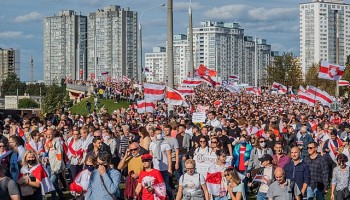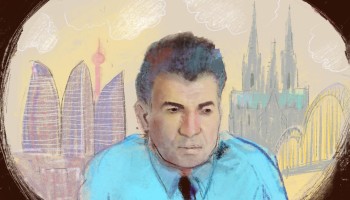Belarusian border guards detained last week a member of Tajikistan’s banned Islamic Renaissance Party (IRPT) and former director general of Safo TV channel human rights activists told OCCRP on Friday.
Farhod Odinayev, 49, was detained on Wednesday at the border to Lithuania. He was on his way to Warsaw for the annual conference of the OSCE Office for Democratic Institutions and Human Rights and was invited by Eurasian Dialogue, registered in Lithuania.
Co-founder of the Belarusian human rights organization Human Constanta, Nastya Loika, told OCCRP that Odinayev was detained based on an international warrant issued by Tajikistan.
“The prosecutor's office must decide on the status of Odinayev Farhod,” Loyka said on Friday, adding that Farkhod was temporarily placed in a detention center not far from the border of Belarus and Lithuania.
According to Tajik media, the President of the Central Asian Human Rights Association (AHRCA, France) Nadezhda Ataeva, asked human rights activists from Belarus to Odinayev to provide him with urgent legal assistance.
Muhammadjon Kabirov, head of the Eurasian Dialogue NGO, told OCCRP that criminal charges were brought against Odinayev Farhod in Tajikistan for "membership in an organization prohibited by the decision of the Supreme Court of Tajikistan."
He said he had informed the OSCE leadership and other participants in the Warsaw meeting about the detention and called on them to assist in the release of the Tajik opposition activist.
From August to November 2013, Odinayev led the Tajik opposition television channel Safo TV in Moscow. His colleagues say that the station was shut down under pressure from Tajik authorities.
According to the Islamic Revival Party, Odinaev lives in Moscow. The party was registered in 1997 after the end of the civil war and operated until 2015, when the Supreme Court of Tajikistan accused it of organizing a riot and banned its activities in September of that year.
The party leadership considers these accusations unfounded.
Tajik authorities, speaking at an OSCE meeting in Warsaw at a session on political prisoners, said 57 party members had been convicted in Tajikistan. Most of the detainees, however, claim the charges against them were politically motivated.
After 2015, dozens of members of banned political parties and organizations were put on the wanted list. Human rights activists say most of the deportees in Tajikistan are at risk of torture and ill-treatment by the government because of their political activities.






